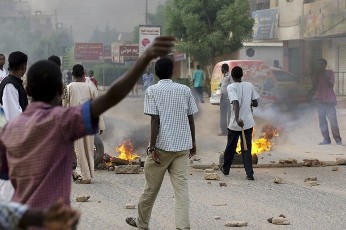Sudan still holding dozens of protesters without charge: HRW
November 28, 2013 (KHARTOUM) – Sudan continues to detain dozens of people without charge in connection with the September protests which broke out after the government announced it was cutting fuel subsidies, a US advocacy group said on Thursday.

Of 11 former detainees interviewed by HRW, six men said they were beaten while in detention, while others said they witnessed security officials beating detainees, or saw injuries on detainees consistent with a beating.
“The abuses reported to us by former detainees raise serious concerns about the welfare of the protesters still in detention,” said Daniel Bekele, HRW Africa director.
“Sudan should immediately put an end to any ill-treatment of detainees, and either charge or free them”, he added.
Sudanese rights groups claim some 800 were arrested in the lead up to, during, and after the protests, with political activists, opposition party members and protesters among those targeted by security forces.
Although most were released within days, the National Security and Intelligence Service (NISS) detained many for weeks, either in detention centres or regular prisons, HRW said.
Despite the release of many detainees as an act of goodwill during and after Eid holidays in October, HRW says dozens more remain in detention without charge or their family or legal representation because of their political views. .
SUBSIDY CUTS TRIGGER PROTESTS
Protests erupted in Khartoum and other towns on 23 September following an announcement by Sudanese president Omer Hassan al-Bashir that the government would lift subsidies on fuel and other basic commodities.
Some demonstrations turned violent as protesters vandalised and set fire to gas sand police stations, with some also throwing stones at police and security forces.
The Sudanese government faced international criticism for its heavy-handed response to the protests, amid claims it used excessive force to quell the unrest, killing and injuring dozens.
On 1 November, rights groups wrote to the African Commission on Human and Peoples’ Rights (ACHPR) calling on the body to investigate the killings of more than 170 protesters, including children, who were shot dead after government security forces fired live ammunition into the demonstrations.
Any investigation by the ACHPR should also include allegations of ill-treatment and torture of detainees, HRW said.
Under article 45 of the African charter on human and peoples’ rights, the ACHPR has the authority to conduct research into human rights practices and to give its views and recommendations to governments.
The commission has yet to formally respond to the letter sent by rights groups.
Sudanese leaders have denied that security forces were involved in the killing of protestors, although the justice minister has since announced an investigation into the deaths of 84 people.
However, human rights groups say the true figure is much higher, with the Sudanese doctors’ union putting the death toll at 210.
DETAINEES MISTREATED
A number of former detainees have spoken to HRW about their mistreatment while in police custody. Some said they were also questioned about their role in organising protests and their affiliations with various groups, including Sudan Change Now, a largely youth-driven movement calling for regime change.
HRW interviewed a Darfuri member of the opposition Democratic Unionist Party (DUP), who said he was arrested on 22 September and held for more than a month in Kober prison, where he was interrogated about his links with rebel groups.
“They beat me with sticks and plastic pipes for four consecutive days and I had to seek medical treatment for my head”, he told HRW.
Among those still in detention in connection with the September protests is Mohammed Ali Mohammad, a 40-year-old Darfuri journalist with al-Akhbar newspaper, detained since 25 September, and Mohammed Farouk Suliman, a senior member of the Sudanese Alliance Party, detained since November 11, following more than a week of NISS interrogations. His whereabouts are unknown.
The NISS has a history of ill-treatment and torture of political detainees, including youth protesters. Sudan’s national security act authorises detentions of up to four-and-a-half months without charge or judicial review, in contravention of international human rights standards.
HRW is among a number of advocacy groups who have called on Sudan to reform the law in line with international standards.
(ST)
